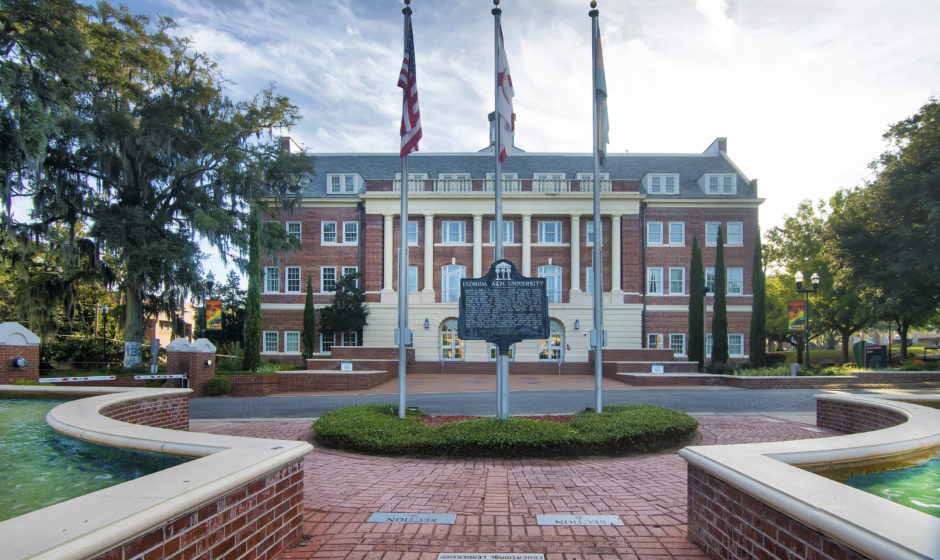FAMU Among HBCUs To Receive National Trust African American Cultural Heritage Action Funding

Florida A&M University (FAMU) is among five Historically Black Colleges and Universities (HBCUs) that will receive grants from the National Trust’s African American Cultural Heritage Action Fund as a part of its HBCU Cultural Heritage Stewardship Initiative.
FAMU will receive $150,000 to develop a campus-wide stewardship plan for its 422-acre Tallahassee campus. The grant is part of more than $650,000 in awards the National Trust’s African American Cultural Heritage Action Fund designated for FAMU, Johnson C. Smith University, Charlotte, N.C., Rust College, Holly Springs, Mississippi, Shaw University, Raleigh, N.C., and Voorhees College, Denmark, S.C.
“As Florida A&M University is the third oldest campus in the State University System of Florida,” said FAMU President Larry Robinson, Ph.D. “We appreciate the support of the National Trust for Historic Preservation to assist the University in furthering the preservation of landmark buildings on our campus.”
The planning grant will allow the faculty, staff, and students across the disciplines of architecture, engineering, and the humanities to collaborate in ways that highlight the national impact of Johnathan C. Gibbs, Lucy Moten and Andrew Carnegie and the buildings named in their honor, Robinson said.
“They also will help preserve the history of the Civil Rights Movement on our campuses where iconic figures like Booker T. Washington, Mary McLeod Bethune, Marian Anderson and others changed American history,” Robinson added.
In addition to the planning grant, each HBCU awardee will receive resources for a student professional development opportunity, enabling one student from each campus to work alongside the project team of architects, engineers, and consultants. This support is provided through the Initiative, in partnership with the Chipstone Foundation, Wunsch Americana Foundation and James Marston Fitch Charitable Foundation. These paid positions will support building a more diverse and equitable field of African American preservationists.
The program is designed to empower HBCUs with resources to protect, preserve and leverage their historic campuses, buildings, and landscapes, ensuring these symbols of African American excellence and American achievement are preserved to inspire and educate future generations.
The Initiative offers two kinds of grants, a $150,000 grant for the development of campus-wide cultural stewardship plans or a $60,000 planning grant to help preserve an individual historic building on or associated with an HBCU campus.
These plans are intended to guide the grantees as they define preservation solutions to existing architectural or landscaping challenges and to identify a course of action that helps conserve their historic resources. The plans will also assist the HBCUs as they engage in capital campaigns and leverage funding and resources to restore and rehabilitate campus facilities.
Launched by the National Trust’s Action Fund in 2020, the program is a partnership with the National Endowment for the Humanities (NEH) with leadership support from the NEH, Ford Foundation, The JPB Foundation, J.M. Kaplan Fund and the Executive Leadership Council. The program is a $1 million initiative that offers the HBCUs funding and leverages the Trust’s 70 years of experience and expertise to help guide the restoration and preservation process at each college or university.
“These grants are significant in light of the recent threat to HBCU campuses,” said Brent Leggs, senior vice president and executive director of the African American Cultural Heritage Action Fund at the National Trust. “Preservation is the strategic counterpoint to centuries of erasure, and it underscores the critical nature of the African American contribution to our nation. Without the doctors, lawyers, engineers and other professionals HBCUs have produced, the American story would not be the same. The Action Fund’s work to preserve the legacies of intellect, activism, and enlightenment on these campuses will inspire future generations of all Americans to believe that, despite the challenge, they too can overcome.”
Since their founding in the 1830s, the number of HBCUs has grown to 105 Congressionally designated schools that tell the remarkable story of African American activism and the fight for education equality. These campuses and landscapes—many of which were designed and built by African American architects and students—display beauty, ingenuity, and craftsmanship and serve as landmarks in their communities. Since listing HBCUs in the list of America’s 11 Most Endangered Historic Places in 1998, the National Trust has advocated and worked to strengthen the stewardship capacity of HBCUs while also raising national awareness of their significance.
The National Trust for Historic Preservation, through its African American Cultural Heritage Action Fund and with the support of its partners, aims to grow the leadership and preservation capacity of HBCUs, which steward some of the most diverse and exceptional historic assets in the world.



